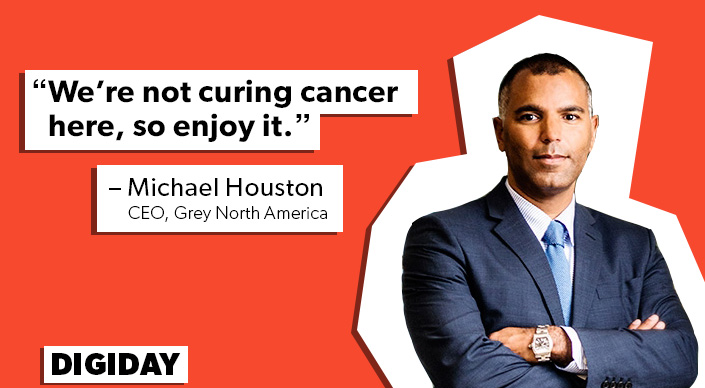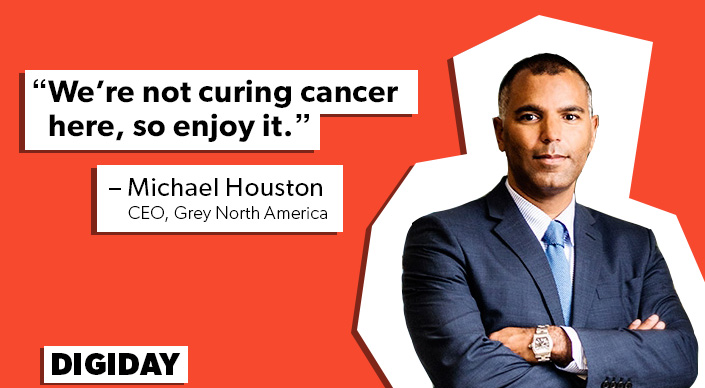
This is “View from the Top,” the latest in a Digiday series featuring creative leaders talking about their career paths and leadership perspectives. Read previous interviews here.
Since joining Grey in 2007, Michael Houston has risen through the ranks at breakneck speed, ascending to the top position — North America CEO — last year. Under him, Grey has gone from strength to strength, shaking off a stodgy image of a shop past its prime to a hot agency capable of culturally smart and beautifully executed work, such as DirecTV’s “Creepy Rob Lowe” and this musical bonanza for Gillette.
We chatted with Houston about his mentors, why advertising should be fun and why bosses should be seen more and heard less.
Who from your pre-advertising career would you say impacted how you work?
Probably the person who impacted my work ethic the most was the father of a friend of mine. He owned a successful architectural firm, and I spent a lot of time there and worked with him. I was one of those kids that came over and never left. I spent a lot of time with him and their family at home and in business settings as well. He was a person who really did a phenomenal job of blending his life and social presence with his work life.
What about in the industry?
The first person for whom I worked for in that capacity was a woman named Linda Srere at Y&R. I was a young account person, and at the time, she was evp of business development. By the time I left, she had risen to become of CEO of Y&R. She and I have a lot of similarities in terms of our career path. What I learned from her was a real love for the business. We’re not curing cancer here, so enjoy it. Yes, there are other jobs where we could make more money on Wall Street or do more potentially meaningful things, but we’ve chosen this, to be creative.
What was it about her that left an impression?
She was one of the better listeners in a business full of talkers. I try not to be the loudest voice in the room and just be an attuned ear in a room. She taught me that it’s better not to talk.
You’re one of the few people to name a female mentor.
It’s interesting. Funny you bring this up, but I’ve spent a lot of time talking and thinking about quiet leadership, someone who can listen and is a little more inclusive. And I think there is a place in our industry and in business in general for quiet leadership, and I think Linda exhibited that.
Sarah Thompson of Droga5 said the old boardroom traits of pounding your hand have become unnecessary.
Yes. I completely agree. It’s just that … people who subscribe to this notion of quiet leadership need to be careful. … People need to be careful not to mistake that for weakness and indecisiveness because it’s absolutely not that.
What’s the hardest part of being a boss?
The hardest days are those days where I think I have more visibility into the macro view of things than anyone else in the organization. At times, it can feel that people tend to work in their own little world. You add those up, and it can at times get to be a little magnified for me. My view is so much bigger; that can be challenging. The hardest thing for me is, I believe that one of my No. 1 job is to bring out the best in other people and help them realize that that I’m a coach, a conductor or quarterback or whatever you want to call it. Getting people to rise to the occasion and understanding how to do that and in a way that’s complementary. It’s hard because a lot of the time the things people think they’re good at are not the things they’re actually good at.
What do you think the young people in your agency worry about?
Their worries are different from what most leaders think they’re worried about. They’re worried about how their voices will be heard. “How will I impart my perspective in professional environments where historically there has been a hierarchy and a code of conduct as it relates to sharing one’s opinion?” See, in the worlds they grew up in, there was little of that.
So what do you tell them?
Look, Grey is a democracy of ideas but not a democracy of decision-making. I make sure people get their opinions heard. I tell them, they don’t have to be the loudest in a meeting. Sometimes it’s the conversation after the meeting that’s the way to go. Pull someone aside, make yourself heard.
More in Marketing

YouTube’s upmarket TV push still runs on mid-funnel DNA
YouTube is balancing wanting to be premium TV, the short-form powerhouse and a creator economy engine all at once.

Digiday ranks the best and worst Super Bowl 2026 ads
Now that the dust has settled, it’s time to reflect on the best and worst commercials from Super Bowl 2026.

In the age of AI content, The Super Bowl felt old-fashioned
The Super Bowl is one of the last places where brands are reminded that cultural likeness is easy but shared experience is earned.






